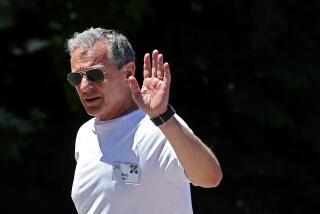Will Selig Be Given a Longer Run on the Job?
- Share via
Amid lingering suspicion that the search could lead back to the hiring of acting Commissioner Bud Selig as a commissioner who isn’t just acting, major league baseball owners, meeting in Arizona this week, are scheduled to appoint a committee that will conduct what is expected to be a protracted search for leadership.
And in another bit of long-delayed business, owners will assign the Arizona Diamondbacks and Tampa Bay Devil Rays, the 1998 expansion teams, to the National and American leagues, respectively.
Division assignments may not be made until the next quarterly meeting, in the spring, but the Diamondbacks will ultimately become the fifth team in the National League West. The Devil Rays will join the American League East, prompting realignment in that league.
There are various scenarios, the most likely being that Detroit will move from the East to the Central, and Kansas City will move from the Central to the West--a shift that the Royals are fighting.
General Manager Herk Robinson said the Royals favor geographical realignment of both leagues and adoption of an unbalanced schedule that requires teams to play a majority of games within their divisions.
In the meantime, Selig continues to deny that he wants to be more than acting commissioner.
“I have never ever wavered,” he said Monday, preparing to leave for Tuesday’s executive council meeting, which opens the three-day winter session in Scottsdale.
The Milwaukee Brewer owner became acting commissioner on Sept. 9, 1992, and predicted he would be in office no more than four months. He has served longer than three previous commissioners: Spike Eckert, Bart Giamatti and Fay Vincent.
With the consummation of the labor agreement on Nov. 26, owners were finally prepared to begin the search for a commissioner, but some continue to lobby Selig to assume the full-time position.
“My father told me to never say never, but I can’t foresee a scenario that would prompt me to change my mind,” he said. “We’re prepared to conduct an aggressive and far-reaching search.”
How long that will take is unclear, but Selig will probably remain as acting commissioner through the 1997 season, at least.
He acknowledged diverse views among the owners as to the type of executive baseball needs.
Those who think they have him in Selig cite some of the developments of the last four years:
A revenue-sharing plan that formerly represented a time bomb in owners’ meetings; division realignment and adoption of a wild-card playoff format; a new TV agreement; introduction of interleague play; creation of a new marketing department and the labor agreement.
“There’s more to do, but I’m satisfied with what we’ve done,” Selig said.
Perhaps, but if a frustrated search committee were to turn back to Selig as the only option, it’s uncertain whether he could get three-fourths approval.
An American League owner who believes a change is mandatory cited Selig’s lack of public magnetism and the perception--right or wrong--that he was significantly responsible for the strike and cancellation of the 1994 World Series. The owner said he and colleagues were also left looking foolish when they approved the same labor agreement they had rejected 20 days earlier, a reversal stemming in large measure from Selig’s 11th-hour change of position.
In addition, the long and bitter labor dispute has clearly deepened the union’s distrust while strengthening a conviction that the industry needs a proven CEO as commissioner. Donald Fehr, the union’s executive director, was quoted in a Washington Post story Monday as saying that as long as Selig remained in a full-time role, he would be an impediment to progress and growth.
“In an operation the size and scope of major league baseball, we need a full-time CEO,” Fehr said later when contacted by The Times.
Nobody has argued longer and harder for a change than Dodger owner Peter O’Malley.
At the news conference where he announced his decision to sell the team, O’Malley predicted it will happen.
“We will have a full-time, independent commissioner,” he said. “There will be a change. We will have a dynamic commissioner.”
The process is about to start.
*
Editor’s note: This is the complete version of a story that appeared in The Times Orange County Edition Tuesday.
More to Read
Go beyond the scoreboard
Get the latest on L.A.'s teams in the daily Sports Report newsletter.
You may occasionally receive promotional content from the Los Angeles Times.










